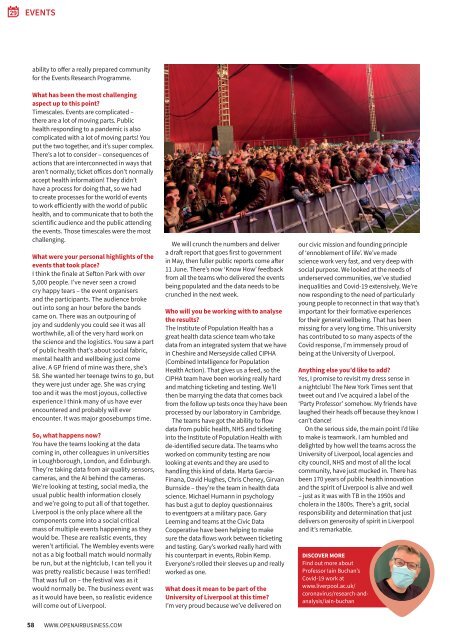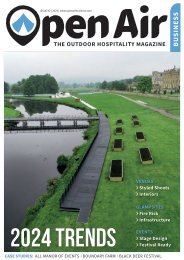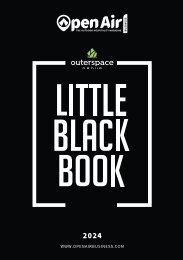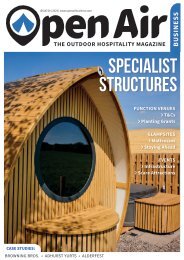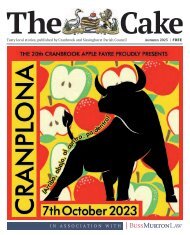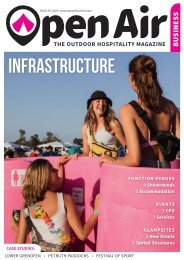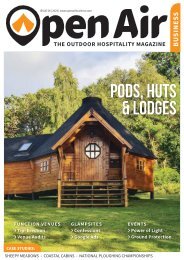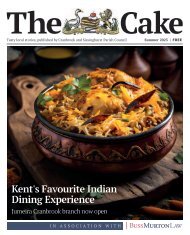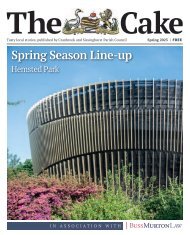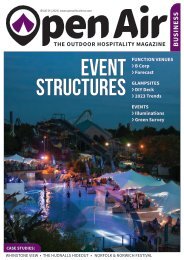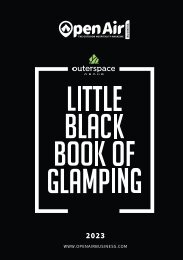May/June 2021
The UK's outdoor hospitality business magazine for function venues, glamping, festivals and outdoor events
The UK's outdoor hospitality business magazine for function venues, glamping, festivals and outdoor events
Create successful ePaper yourself
Turn your PDF publications into a flip-book with our unique Google optimized e-Paper software.
EVENTS<br />
ability to offer a really prepared community<br />
for the Events Research Programme.<br />
What has been the most challenging<br />
aspect up to this point?<br />
Timescales. Events are complicated –<br />
there are a lot of moving parts. Public<br />
health responding to a pandemic is also<br />
complicated with a lot of moving parts! You<br />
put the two together, and it’s super complex.<br />
There’s a lot to consider – consequences of<br />
actions that are interconnected in ways that<br />
aren’t normally; ticket offices don’t normally<br />
accept health information! They didn’t<br />
have a process for doing that, so we had<br />
to create processes for the world of events<br />
to work efficiently with the world of public<br />
health, and to communicate that to both the<br />
scientific audience and the public attending<br />
the events. Those timescales were the most<br />
challenging.<br />
What were your personal highlights of the<br />
events that took place?<br />
I think the finale at Sefton Park with over<br />
5,000 people. I’ve never seen a crowd<br />
cry happy tears – the event organisers<br />
and the participants. The audience broke<br />
out into song an hour before the bands<br />
came on. There was an outpouring of<br />
joy and suddenly you could see it was all<br />
worthwhile, all of the very hard work on<br />
the science and the logistics. You saw a part<br />
of public health that’s about social fabric,<br />
mental health and wellbeing just come<br />
alive. A GP friend of mine was there, she’s<br />
58. She wanted her teenage twins to go, but<br />
they were just under age. She was crying<br />
too and it was the most joyous, collective<br />
experience I think many of us have ever<br />
encountered and probably will ever<br />
encounter. It was major goosebumps time.<br />
So, what happens now?<br />
You have the teams looking at the data<br />
coming in, other colleagues in universities<br />
in Loughborough, London, and Edinburgh.<br />
They’re taking data from air quality sensors,<br />
cameras, and the AI behind the cameras.<br />
We’re looking at testing, social media, the<br />
usual public health information closely<br />
and we’re going to put all of that together.<br />
Liverpool is the only place where all the<br />
components come into a social critical<br />
mass of multiple events happening as they<br />
would be. These are realistic events, they<br />
weren’t artificial. The Wembley events were<br />
not as a big football match would normally<br />
be run, but at the nightclub, I can tell you it<br />
was pretty realistic because I was terrified!<br />
That was full on – the festival was as it<br />
would normally be. The business event was<br />
as it would have been, so realistic evidence<br />
will come out of Liverpool.<br />
We will crunch the numbers and deliver<br />
a draft report that goes first to government<br />
in <strong>May</strong>, then fuller public reports come after<br />
11 <strong>June</strong>. There’s now ‘Know How’ feedback<br />
from all the teams who delivered the events<br />
being populated and the data needs to be<br />
crunched in the next week.<br />
Who will you be working with to analyse<br />
the results?<br />
The Institute of Population Health has a<br />
great health data science team who take<br />
data from an integrated system that we have<br />
in Cheshire and Merseyside called CIPHA<br />
(Combined Intelligence for Population<br />
Health Action). That gives us a feed, so the<br />
CIPHA team have been working really hard<br />
and matching ticketing and testing. We’ll<br />
then be marrying the data that comes back<br />
from the follow up tests once they have been<br />
processed by our laboratory in Cambridge.<br />
The teams have got the ability to flow<br />
data from public health, NHS and ticketing<br />
into the Institute of Population Health with<br />
de-identified secure data. The teams who<br />
worked on community testing are now<br />
looking at events and they are used to<br />
handling this kind of data. Marta Garcia-<br />
Finana, David Hughes, Chris Cheney, Girvan<br />
Burnside – they’re the team in health data<br />
science. Michael Humann in psychology<br />
has bust a gut to deploy questionnaires<br />
to eventgoers at a military pace. Gary<br />
Leeming and teams at the Civic Data<br />
Cooperative have been helping to make<br />
sure the data flows work between ticketing<br />
and testing. Gary’s worked really hard with<br />
his counterpart in events, Robin Kemp.<br />
Everyone’s rolled their sleeves up and really<br />
worked as one.<br />
What does it mean to be part of the<br />
University of Liverpool at this time?<br />
I’m very proud because we’ve delivered on<br />
our civic mission and founding principle<br />
of ‘ennoblement of life’. We’ve made<br />
science work very fast, and very deep with<br />
social purpose. We looked at the needs of<br />
underserved communities, we’ve studied<br />
inequalities and Covid-19 extensively. We’re<br />
now responding to the need of particularly<br />
young people to reconnect in that way that’s<br />
important for their formative experiences<br />
for their general wellbeing. That has been<br />
missing for a very long time. This university<br />
has contributed to so many aspects of the<br />
Covid response, I’m immensely proud of<br />
being at the University of Liverpool.<br />
Anything else you’d like to add?<br />
Yes, I promise to revisit my dress sense in<br />
a nightclub! The New York Times sent that<br />
tweet out and I’ve acquired a label of the<br />
‘Party Professor’ somehow. My friends have<br />
laughed their heads off because they know I<br />
can’t dance!<br />
On the serious side, the main point I’d like<br />
to make is teamwork. I am humbled and<br />
delighted by how well the teams across the<br />
University of Liverpool, local agencies and<br />
city council, NHS and most of all the local<br />
community, have just mucked in. There has<br />
been 170 years of public health innovation<br />
and the spirit of Liverpool is alive and well<br />
– just as it was with TB in the 1950s and<br />
cholera in the 1800s. There’s a grit, social<br />
responsibility and determination that just<br />
delivers on generosity of spirit in Liverpool<br />
and it’s remarkable.<br />
DISCOVER MORE<br />
Find out more about<br />
Professor Iain Buchan’s<br />
Covid-19 work at<br />
www.liverpool.ac.uk/<br />
coronavirus/research-andanalysis/iain-buchan<br />
58 WWW.OPENAIRBUSINESS.COM


